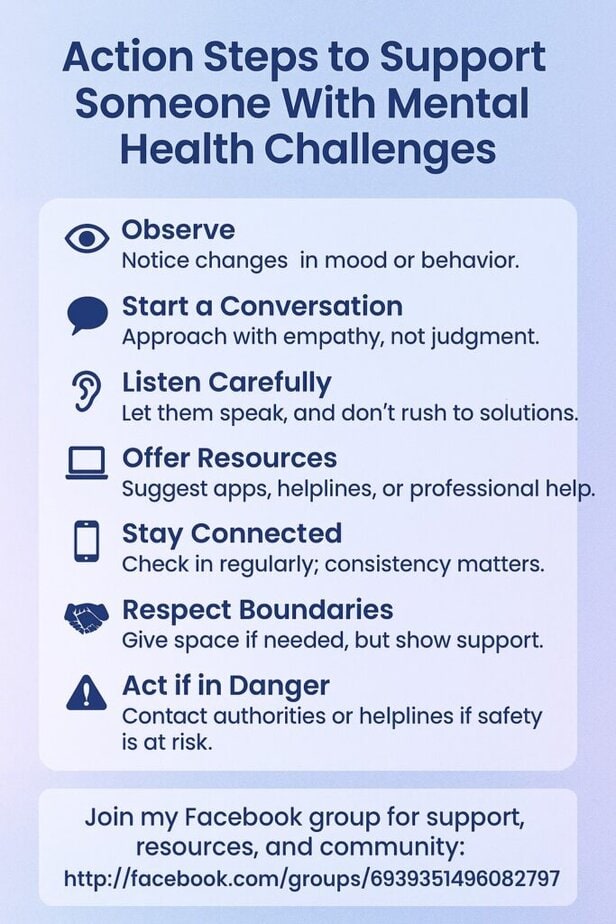How To Help Someone With Mental Health Issues?

We will all experience some form of mental health challenge at some point in our lives. When this happens, many of us want to help and support others, yet we may not always recognize who is struggling. Whether it’s a friend, family member, colleague, or someone you’ve met online, your innate inclination is to offer assistance. In 2025, awareness of mental health has grown significantly, and there are more resources than ever to provide meaningful support. This article explores mental health challenges and ways to assist individuals navigating them.

Is There Any Way to Tell if Someone Has a Mental Health Issue?
Daily life presents challenges for everyone, but some individuals appear to face more significant difficulties than others. Sometimes it’s obvious who is struggling, but often, mental health struggles remain hidden. People we care about deeply may be enduring profound struggles in their everyday lives.
It’s important to remain observant without attempting to diagnose someone yourself, as misinterpretation can worsen the situation. Symptoms of mental health issues vary from person to person, so a change in behavior, mood, or interest in activities can be key indicators. For those interested in learning about different mental health conditions, here’s a helpful resource: A-Z of Mental Health.
What Might I Do for Someone Who’s Suffering?
One of the most effective ways to help is simply to start a conversation. If you’re not able to express your own struggles or be open, it can be challenging to support someone else.
When you notice someone close to you is behaving differently, take the initiative to speak with them. Approach them with compassion and understanding—never criticize or judge. Negative reactions can break trust and prevent them from seeking further support.
Prioritize open communication first. This allows you to better understand their situation and determine how to help. In some cases, individuals may not be ready to talk. When this happens, consider reaching out to someone close to them or give them space to process their emotions. Never pressure anyone to open up if they are not prepared.
How to Have a Conversation About Mental Health?
- Create a Distraction-Free Zone: Minimize interruptions from phones, TV, or other people. Ensure the person you’re speaking with has your undivided attention.
2. Let Them Lead: Allow them to guide the conversation at their own pace. Avoid imposing your own agenda, as this can feel pressuring rather than supportive.
3. Never Judge or Criticize: Avoid passing judgment or offering criticism when they share something personal. This fosters trust and safety.
4. Never Diagnose: Unless explicitly asked, refrain from diagnosing or offering solutions. Your role is to be present and supportive.
5. Ask Thoughtful Questions: Ask how they feel in specific situations rather than why they did something. Avoid overwhelming them with too many questions at once.
6. Listen Carefully: Speak only when necessary and request clarification politely if something is unclear. Respect their viewpoint even if you disagree.
7. Have Safety Standards: If you notice concerning behavior or statements, take action to ensure their safety, which may include contacting professionals.impression of pressure rather than genuine assistance. Therefore, it’s crucial to proceed with care and sensitivity.
How to Assist Someone Who Is in Trouble?
Some individuals with mental health issues may feel vulnerable or consider suicide. In these situations, they need support urgently. Here are some practical steps:
- Listen without judging or criticizing.
- Ask if they need anything.
- Show compassion and respect.
- Avoid confrontation.
- Contact authorities if you believe they’re in danger.
- Ask if they want you to contact someone on their behalf.
People experiencing mental health crises often feel misunderstood. Offering reassurance about their unique qualities and being a supportive presence can make a significant difference.

Suicide is a Serious Matter.
If you suspect someone is contemplating suicide, whether in person or on social media, encourage them to seek professional help immediately. Teletherapy and crisis helplines are accessible in 2025 and provide trained support. If they refuse help, you may need to contact authorities to ensure their safety.
- 7 Cups – Online emotional support and counseling
- Suicide & Crisis Lifeline – 24/7 confidential support
- BetterHelp – Teletherapy platform
- Talkspace – Teletherapy platform
Even a simple, non-judgmental conversation can make a profound impact. Listening and validating someone’s feelings can be life-changing, especially when they feel isolated.
Internal Resources for Support
In The End.
We all have people we deeply care about. If you notice someone struggling, offer your support with kindness, empathy, and patience. Respect their boundaries if they choose not to open up, and be prepared to take immediate action if their safety is at risk. In 2025, mental health resources, apps, and teletherapy options provide more ways than ever to support those in need—but your presence, compassion, and understanding remain the most powerful tools.
Feel free to use the comments section to ask questions about helping someone with mental health challenges. Even small actions of support can make a meaningful difference.
Feel free to use the comments section below to inquire about any concerns or questions you might have regarding aiding someone dealing with mental health issues. I am more than happy to provide assistance, drawing from my extensive experience in this field.
Related: What is a Mental Health Issue?
What is the Importance of Communication Skills in Life

Kiersti writes on self-love and personal development professionally. Over the past ten or so years, she has studied self-love and personal growth. Visit https://womansdailyneeds.com/ to learn more about what she does, and like her on Facebook at https://facebook.com/womansdailyneeds to keep up with her.



20 Responses
I really appreciate how in depth this article goes. Mental health is a very serious issue that is becoming more and more common in our society, especially since covid. The advise you had about not forcing the conversation and building trust before pushing them to talk about what is going on. Letting people in crisis lead the conversation is a great way to give them an accepting and safe environment. Great tips for those who want to help. Thank you for sharing this.
Thank you for taking the time to read it. I agree that many people struggle with mental health issues, even if they are unaware of it. The problem is that forcing the dialogue accomplishes nothing and, in fact, makes matters worse rather than better. Thank you one more. With that, I recommend that you read some of my other articles. They will assist you and those you know.
This is a very well written article. I know many people that including myself that struggle with mental health and I know it is a touchy subject. I try to let them talk if they want to about it not forcing the conversation. I only talk when I feel it is necessary. It is hard for me to watch them be so unhappy and suffering. I want to help, but sometimes they don’t want my help or to talk and I will respect that.
I know that sometimes I would like to talk to someone and I know it is hards. I don’t want to be judged or told “just be happy” or “stop thinking like that”. Those words don’t help and it makes you feel that someone isn’t listening or taking you seriously. I find that my head is my worst enemy at times, sometimes if I write down what is bothering me it will lead me alone for awhile. That is if I can’t talk to someone about it in a safe place.
Thank you!
Thank you really a lot. I really understand because I’ve been dealing with mental health issues for about 18 years. And it’s really just a sensitive subject. When I learn that someone committed suicide due to mental illness, it crushes my heart. That being said, whenever I see someone on social media complaining about their life, I always reach out. We have no idea what anyone else is going through. Yes, forcing the topic only makes things worse rather than better. People sometimes just want to be left alone and not spoken to since it serves no one.I agree that seeing someone miserable is really upsetting and crushes my heart. I’m delighted you share my sentiments.
Finally, it is critical to wait until they want to speak because forcing it can and will exacerbate the situation.
When it comes to mental health, I find it difficult to talk about. All because of other people’s retweets, which only makes matters worse. All the things individuals can say are perceived to be cruel. It’s not quite that straightforward. Anyway, thanks for the comment, and you’ve just given me an excellent topic for an article. Have a lovely day and get well soon, okay?
It is very soothing and consoling when we have a shoulder to cry on and an empathetic listener when are going through challenges adversely affecting our mental health. This article is educative and it is good to know that this type of awareness is made available so that everyone will look out for each other. Whether family member, neighbor, or colleague.
I couldn’t agree more.
What a great article…and it’s especially important in this day and age. I know so many friends who are struggling with real problems these days. It’s so great how you emphasized the need to listen first and be non-judgmental. That is so important as talking too much or judging someone who is in need can backfire in the worst way. I’ve seen this happen many times before. And then communication just stops. I think mental illness is a touchy subject that most people are afraid to speak about. But it is way more common place that we’d like to think. Thanks for sharing these helpful ideas on how to help someone in need. As you say, sometimes all a person really needs is someone to listen to them.
It’s so sad how many people are dealing with mental issues and so much more. It just causes many more issues when people don’t take awareness on it. With that said thanks for reading.
Mental health issues seem to be on the increase, and specially during the past two years with so many people being forced not to have social interaction and see family members and friends. Society still seems to ignore the importance of providing adequate help and support, so it has become essential that we help those around us.
Thank you for highlighting the importance of mental health and giving us so many ways to recognise someone that needs help, and how to deal with it.
It’s so sad how many are dealing with mental health issues. Many because of COVID have it and it’s heartbreaking. It’s about time one says something about it. Not many people want to talk about the issue due to scarcity.
Thanks so much for commenting.
This is a very powerful yet sensitive topic or post to speak upon yet you found a way to address mental health and how to help in a very clean and simplistic way. Just follow steps one through seven to give assistance to someone who needs the help and willing to have a conversation about it as well. It can not be a one-way conversation, you speaking to them about what he/she needs but a two-way flow of understanding and acceptance. Help for a loved one or friend is always available, it is up to the individual to know that they need help and be willing to take the necessary steps to be successful at mental clarity.
I couldn’t agree more. In today society people have trouble talking about this because of scarcity and that of offending people. For someone who has dealt with such issues I find that it’s vital to talk about. And since I do know much about it I’m able to speak. So thanks so much for sharing your thoughts.
Kiersti,
First off, thank you so much for this article!!
My daughter is having some issues, I have been trying to get her to seek professional help, yet she wants to rely on self-diagnosing, which we all know is a big NO-NO.
I have used passive-aggressive tactics with her like sending her a link to a mental health website for a local office after she had a manic episode and expressed she needed help. She ignored the link and went to Google instead, I am so frustrated, do you have any advice?
Stacie,
You’re so welcome.
Yes that isn’t something that one should be doing .
As for advice simply being there and spending time with your daughter will truly help her. Young kids need to know that they matter and when they have that care and love it can make the biggest difference.
Thank you so much for sharing this.
Mental health is an important issue that affects many people.
If you’re looking to support someone with mental health issues, here are a few things you can do: listen actively and nonjudgmentally, encourage seeking professional help, offer practical support, and take care of your own mental health.
Being a supportive and understanding presence can make a big difference for someone struggling with mental health issues.
Remember to listen, encourage seeking help, offer practical support, and take care of your own mental health.
You’re so welcome!
Yes it does and it’s so vital to be spoken about. However, many people avoid the topic.
Those are some great ways to support someone who maybe suffering. As support can do so much to help someone.
Anyway thanks so much for sharing your thoughts. I highly appreciate it.
One of the easiest ways to get on with life is to get support from friends and family. It is easier to surmount any life issue if you get support. That is why I am a constant advocate of family support, especially that of immediate siblings. But like you identified, it is difficult to identify when someone has a mental issue. And I must say a big thank you for spelling out the right way to communicate with people suffering with such challenges
I could agree more. Having that support truly can make a big difference in one’s life or not. Without that support it can make life a lot more difficult. I like that you thrive to help and support others. I am the same as well. Anyway thanks for your comment it means a lot.
Your article is spot on when dealing with mental health, as we do have to be careful when talking with others. My sister-law just passed away on December 24th, the last month of her life she would cry a lot in pain and just wanted to stay in bed alone away from family. Her brothers didn’t know how to talk with her and just made things worse as they would not listen to her but instead criticized her and said stop crying things could not be that bad when they were. Everyone needs to let the person lead the conversation and don’t diagnose them themselves.
I am so sorry for your loss. That of a mental illness causes pain not on those who are dealing with it but also those around them. That’s why it is so important to just love and be there for the person when they need it the most.